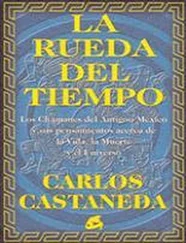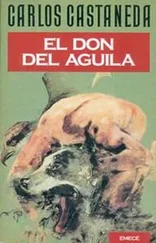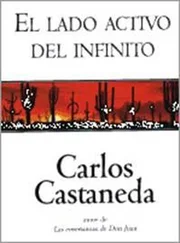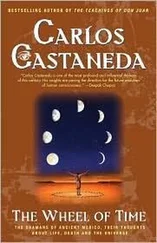Sunday, 24 December 1961
'The devil's weed has never protected anyone. She serves only to give power. Mescalito, on the other hand, is gentle, like a baby.'
'But you said Mescalito is terrifying at times.'
'Of course he is terrifying, but once you get to know him, he is gentle and kind.'
'How does he show his kindness?'
'He is a protector and a teacher.'
'How does he protect?'
'You can keep him with you at all times and he will see that nothing bad happens to you.'
'How can you keep him with you at all times?'
'In a little bag, fastened under your arm or around your neck with a string.'
'Do you have him with you?'
'No, because I have an ally. But other people do.'
'What does he teach?' 'He teaches you to live properly.'
'How does he teach?'
'He shows things and tells what is what [enzenna las cosas у te dice lo que son].'
'How?'
'You will have to see for yourself.'
Tuesday, 30 January 1962
'What do you see when Mescalito takes you with him, don Juan?'
'Such things are not for ordinary conversation. I can't tell you that.'
'Would something bad happen to you if you told?'
'Mescalito is a protector, a kind, gentle protector; but that does not mean you can make fun of him. Because he is a kind protector he can also be horror itself with those he does not like.'
'I do not intend to make fun of him. I just want to know what he makes other people do or see. I described to you all that Mescalito made me see, don Juan.'
'With you it is different, perhaps because you don't know his ways. You have to be taught his ways as a child is taught how to walk.'
'How long do I still have to be taught?'
'Until he himself begins to make sense to you.'
'And then?'
'Then you will understand by yourself. You won't have to tell me anything any more.'
'Can you just tell me where Mescalito takes you?'
'I can't talk about it.'
'All I want to know is if there is another world to which he takes people.'
'There is.'
'Is it heaven?' (The Spanish word for heaven is cielo, but that also means 'sky'.)
'He takes you through the sky [cielo].'
'I mean, is it heaven [cielo] where God is?'
'You are being stupid now. I don't know where God is.' 'Is Mescalito God — the only God? Or is he one of the gods?' 'He is just a protector and a teacher. He is a power.' 'Is he a power within ourselves?'
'No. Mescalito has nothing to do with ourselves. He is outside us.'
'Then everyone who takes Mescalito must see him in the same form.'
'No, not at all. He is not the same for everybody.'
Thursday, 12 April 1962
'Why don't you tell me more about Mescalito, don Juan?' 'There is nothing to tell.'
'There must be thousands of things I should know before I encounter him again.'
'No. Perhaps for you there is nothing you have to know. As I have already told you, he is not the same for everyone.'
'I know, but still I'd like to know how others feel about him.' 'The opinion of those who care to talk about him is not worth much. You will see. You will probably talk about him up to a certain point, and from then on you will never discuss him.' 'Can you tell me about your own first experiences?' 'What for?'
'Then I'll know how to behave with Mescalito.' 'You already know more than I do. You actually played with him. Someday you will see how kind the protector was with you. That first time I am sure he told you many, many things, but you were deaf and blind.'
Saturday, 14 April 1962
*Does Mescalito take any form when he shows himself?' 'Yes, any form.'
'Then, which are the most common forms you know?' 'There are no common forms.'
'Do you mean, don Juan, that he appears in any form, even to men who know him well?'
'No. He appears in any form to those who know him only a little, but to those who know him well, he is always constant.'
'How is he constant?'
'He appears to them sometimes as a man, like us, or as a light.'
'Does Mescalito ever change his permanent form with those who know him well?'
'Not to my knowledge.'
Friday, 6 July 1962
Don Juan and I started on a trip late in the afternoon of Saturday 23 June. He said we were going to look for honguitos (mushrooms) in the state of Chihuahua. He said it was going to be a long, hard trip. He was right. We arrived in a little mining town in northern Chihuahua at 10:00 p.m. on Wednesday 27 June. We walked from the place I had parked the car at the outskirts of town, to the house of his friends, a Tarahumara Indian and his wife. We slept there.
The next morning the man woke us up around five. He brought us gruel and beans. He sat and talked to don Juan while we ate, but he said nothing concerning our trip.
After breakfast the man put water into my canteen, and two sweet-rolls into my knapsack. Don Juan handed me the canteen, fixed the knapsack with a cord over his shoulders, thanked the man for his courtesies, and, turning to me, said, 'It is time to go.'
We walked on the dirt road for about a mile. From there we cut through the fields and in two hours we were at the foot of the hills south of town. We climbed the gentle slopes in a southwesterly direction. When we reached the steeper inclines, don Juan changed directions and we followed a high valley to the east. Despite his advanced age, don Juan kept up a pace so incredibly fast that by midday I was completely exhausted. We sat down and he opened the bread sack.
'You can eat all of it, if you want,' he said.
'How about you?'
'I am not hungry, and we won't need this food later on.'
I was very tired and hungry and took him up on his offer. I felt this was a good time to talk about the purpose of our trip, and quite casually I asked, 'Do you think we are going to stay here for a long time?'
'We are here to gather some Mescalito. We will stay until tomorrow.'
'Where is Mescalito?'
'All around us.'
Cacti of many species were growing in profusion all through the area, but I could not distinguish peyote among them.
We started to hike again and by three o'clock we came to a long, narrow valley with steep side hills. I felt strangely excited at the idea of finding peyote, which I had never seen in its natural environment. We entered the valley and must have walked about four hundred feet when suddenly I spotted three unmistakable peyote plants. They were in a cluster a few inches above the ground in front of me, to the left of the path. They looked like round, pulpy, green roses. I ran towards them, pointing them out to don Juan.
He ignored me and deliberately kept his back turned as he walked away. I knew I had done the wrong thing, and for the rest of the afternoon we walked in silence, moving slowly on the flat valley floor, which was covered with small, sharp-edged rocks. We moved among the cacti, disturbing crowds of lizards and at times a solitary bird. And I passed scores of peyote plants without saying a word.
At six o'clock we were at the bottom of the mountains that marked the end of the valley. We climbed to a ledge. Don Juan dropped his sack and sat down.
I was hungry again, but we had no food left; I suggested that we pick up the Mescalito and head back for town. He looked annoyed and made a smacking sound with his lips. He said we were going to spend the night there.
We sat quietly. There was a rock wall to the left, and to the right was the valley we had just crossed. It extended for quite a distance and seemed to be wider than, and not so flat as, I had thought. Viewed from the spot where I sat, it was full of small hills and protuberances.
'Tomorrow we will start walking back,' don Juan said with— out looking at me, and pointing to the valley. 'We will work our way back and pick him as we cross the field. That is, we will pick him only when he is in our way. He will find us and not the other way around. He will find us — if he wants to.'
Читать дальше












